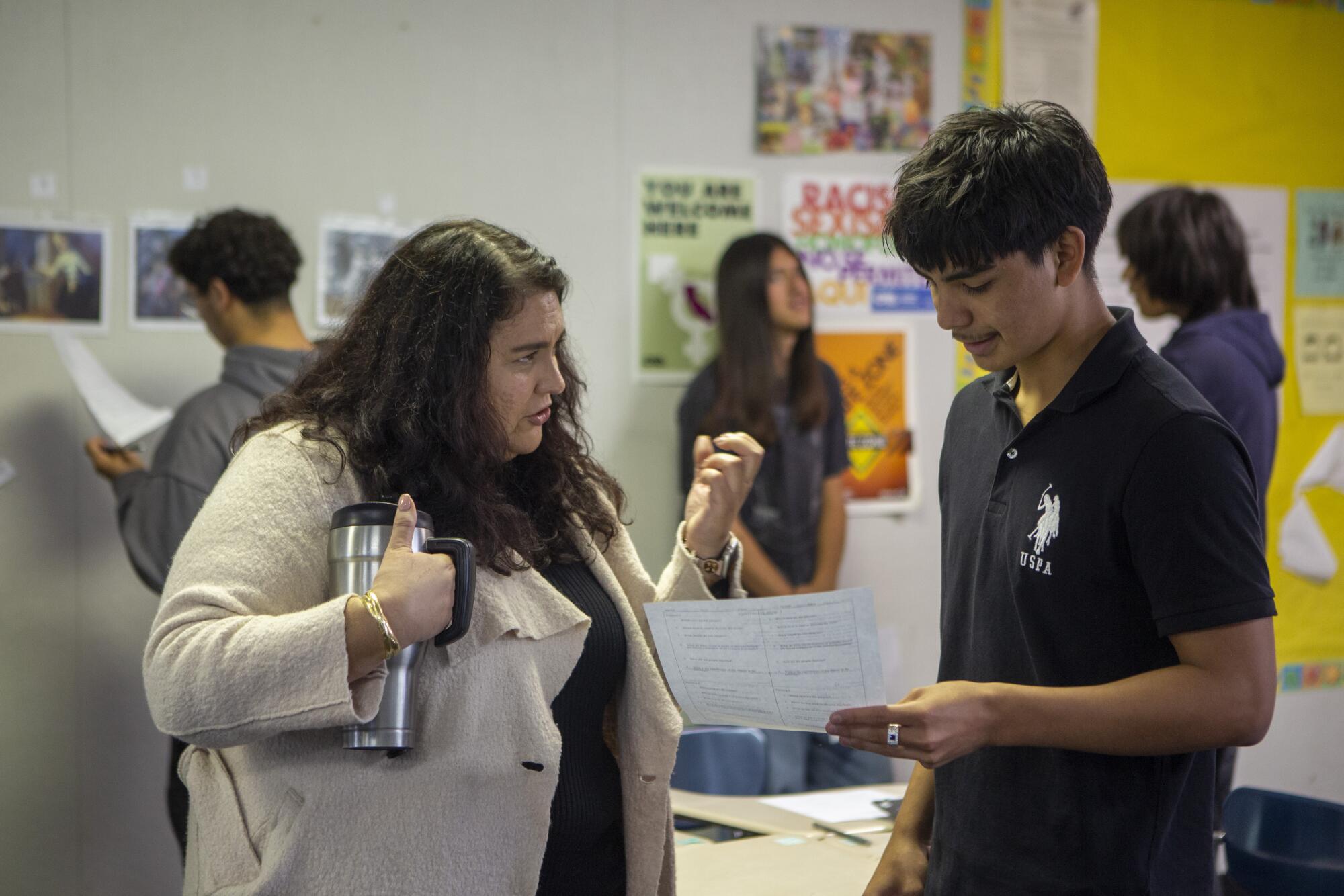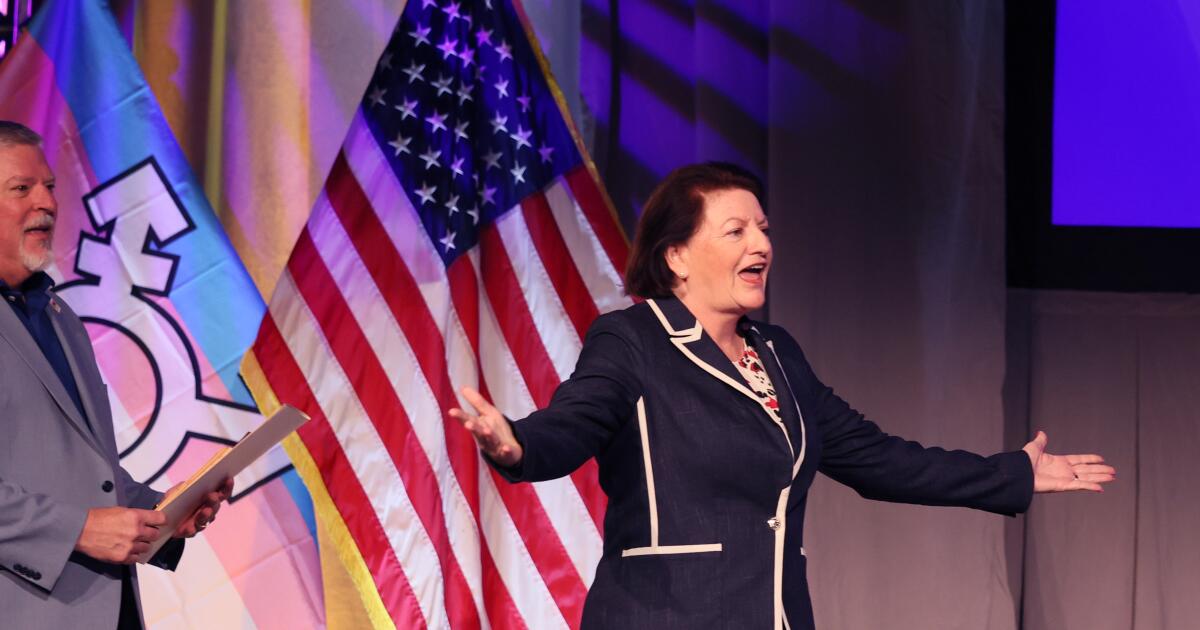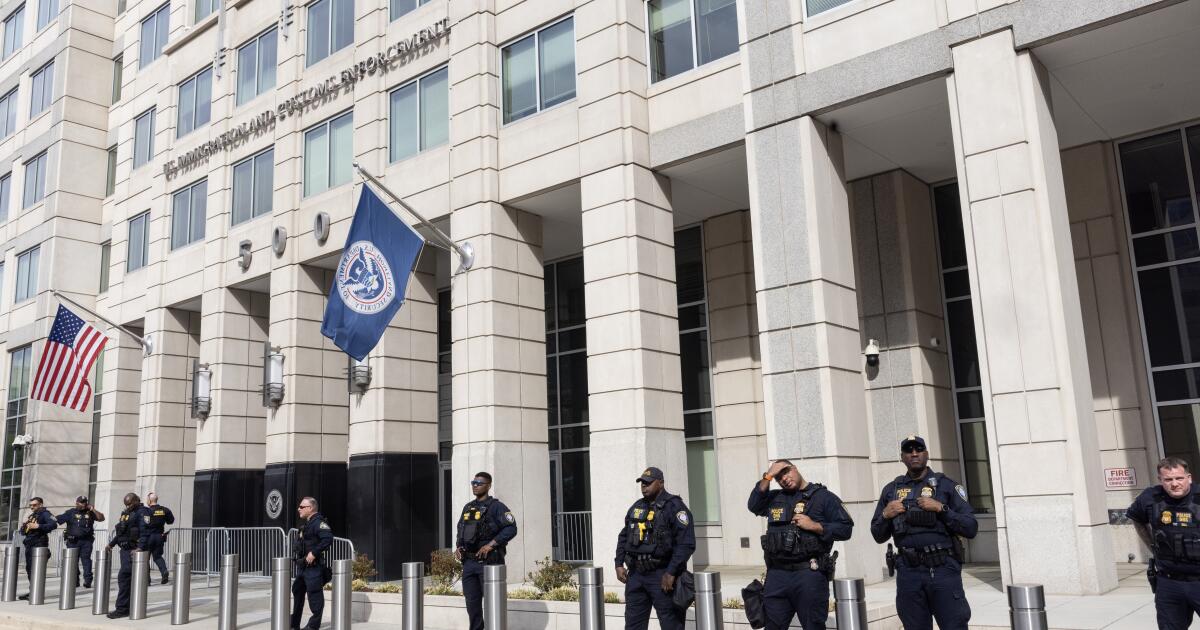California ethnic studies mandate in limbo after funding pause
California became a national pioneer four years ago by passing a law to make ethnic studies a high school graduation requirement. But only months before the policy is to take effect, Gov. Gavin Newsom is withholding state funding — delaying the mandate as the course comes under renewed fire.
The pause has left school districts throughout the state in limbo nearly four years after the launch deadline was set. Beginning this fall, students entering 9th grade would have been the first class required to pass a one-semester class at some point during their high school years.
But under the 2021 law, the mandate to reach 5.8 million students does not take effect unless the state provides more money to pay for the course. The funding would cover the cost of materials and the teacher staffing and training that go along with adding a new field of study.
Newsom’s office, which will issue its May revision of next year’s proposed state budget Wednesday amid a tightening financial outlook, did not respond to questions about why he has not included funding for the ethnic studies requirement that he approved, praising it as an avenue to “teach students about the diverse communities that comprise California.”
A spokesperson for the Department of Finance answered on Newsom’s behalf.
“The budget doesn’t include funding that would trigger the ethnic studies graduation requirement,” said H.D. Palmer. As to the reason why, “the short answer is that the state has limited available ongoing resources.”
At the onset, $50 million in seed money was allocated statewide, but the law stated an additional unspecified amount would be needed in the future. State officials later set that amount at about $276 million. But several years have passed without state officials budgeting the funding.
As California’s more than 1,600 high schools wind down for the year, it is uncertain how many will offer the course in the fall. Some — including Los Angeles Unified, Santa Monica Unified and Alhambra Unified — will go forward with ethnic studies no matter what. Some of these districts, including L.A. Unified, already have their own ethnic studies graduation requirement.
Others — including Chino Valley Unified — will shelve the class until the law forces them to offer it.
Still others, such as Lynwood Unified, in south L.A. County, say they are deeply concerned about any wavering in the state’s commitment to the subject.
State funding would be “critically important for sustainability,” according to a Lynwood district statement. Without it, the school district is going to cancel the course and instead teach units of ethnic studies within other classes.
“We remain committed to the principles and purpose behind ethnic studies — ensuring our students see themselves and others reflected in the curriculum,” Lynwood Supt. Gudiel R. Crosthwaite said. “However, like many school districts across California, we are navigating the dual challenge of declining enrollment and insufficient state funding to support new course mandates.”
Renewed controversy
The current political environment complicates the launch of the ethnic studies requirement.
State officials were moving toward an ethnic studies requirement amid the nation’s racial reckoning after the 2020 murder of George Floyd at the hands of Minneapolis police, the rise of the Black Lives Matter movement, and violent attacks on Asian Americans.
Many ethnic studies supporters believe that anti-racist teachings and exploring the history and perspectives of marginalized groups — Black and Indigenous people, Asians and Latinos — are key to bridging misunderstanding among students, reducing racial and ethnic conflict, and motivating teenagers to pursue social justice causes.
But not everyone sees ethnic studies the same way. Some religious and political conservatives view the state’s guidelines for ethnic studies as the kind of “woke” ideologies in education that President Trump has vowed to eliminate as he seeks to do away with diversity, equity and inclusion programming in schools.
California’s ethnic studies curriculum guide embraces pro-LGBTQ+ content and speaks of connecting students to “contemporary social movements that struggle for social justice and an equitable and democratic society, and conceptualize, imagine, and build new possibilities for a post-racist, post-systemic-racism society.”
With tensions high over how race, religion and ethnicity are taught in schools, state lawmakers recently explored legislation that would have put strict standards on how ethnic studies could be taught. That bill was supported by 31 legislators and its sponsors expressed particular concern about how ethnic studies teachers are presenting Jews and the history of the Israeli-Palestinian conflict — re-igniting long-simmering concerns about the field of study.
Amid weekend discussions, however, the group shelved the bill — which dealt only with ethnic studies. Instead, lawmakers unveiled a broader piece of school legislation aimed at ending campus antisemitism while providing greater “anti-discrimination protections related to nationality and religion.”
A hearing on the new bill is set for Wednesday.
Teacher Amber Palma talks with student Angel Alvarez during an ethnic studies class at Firebaugh High School in Lynwood.
(Hon Wing Chiu / For The Times)
Although the bill’s provisions are still being crafted, it would apply to any course or schooling activity — and include a mechanism for stronger oversight of K-12 ethnic studies, which remains central to the concerns of the bill’s primary sponsors, including Assemblymember Dawn Addis (D-Morro Bay).
“Jewish families and children have been made, in many instances, to feel unwelcome or made the targets of hate and discrimination in school — where they’re supposed to feel safe and supported,” Addis said. “We want to get all the things in place to get back to what schools are supposed to be doing.”
Troy Flint, chief communications officer for the California School Boards Assn. said the ethnic studies requirement “has been fraught since its inception, and there have been starts, stumbles and restarts to try and develop a piece of legislation that’s amenable to all the different interest groups. … And I don’t know that we’ve reached that point yet.”
“School districts are in a bind,” both in terms of their costs and their academic program, he added, “because there’s a possibility a mandate could be implemented, but it’s uncertain.”
‘White supremacists generally think that they’re above people because they have money or good history or they’re related to a king or something. And I’ve seen countless immigrants get deported or accused of something because they’re considered not human or aliens. At the end of the day, we’re all human. What’s the point of having power and not using it for good?’
— Jayden A Perez, 15, a ninth-grader at Firebaugh High School in Lynwood
(Hon Wing Chiu / For The Times)
What’s happened since the law was approved?
Newsom signed the ethnic studies graduation requirement into law in 2021, giving districts four years to develop one or more ethnic studies classes, using a menu of materials and topics from the nearly 700-page state model curriculum guide, approved by the State Board of Education.
That curriculum guide had been a source of controversy — leading Newsom to veto an earlier bill for an ethnic studies requirement. After substantial revisions, the final version eliminated course materials that likened the Palestinian cause, in its conflict with Israel, to the struggles of marginalized groups in America — because critics said it lacked balance or nuance.
The revision also toned down what critics characterized as obscure academic jargon and bias against capitalism. More groups were added as potential study topics, including Jewish Americans, Sikhs and Armenians.
Under current law, the state’s model curriculum serves as a guide — not a required set of lessons. School districts are responsible for developing their courses and are free to teach units that reflect their enrollment. Students in Glendale, with its large Armenian American population, for example, could study the Armenian immigrant experience.
‘Understanding one’s background or ethnicity can result in conflict, but I believe that I can build bridges, because many people can understand one another and where they originally came from and what they grew up in. People should be able to talk about this and show our side of the story.’
— Gabriel Smith, 14, a ninth-grader at Firebaugh High School in Lynwood
(Hon Wing Chiu / For The Times)
This flexibility has allowed academic experts in the field to prepare prepackaged courses and lessons that vary widely to help schools prepare. Some are free to download. Independent Institute, for example, has posted one free curriculum that consciously aims to be less controversial in terms of current political disputes.
The group with perhaps the most long-standing ties to the field of ethnic studies in California has created a curriculum called Liberated Ethnic Studies. This curriculum also is free to download, although some of its creators and supporters have worked as school district consultants.
A portion of the Liberated content guide has worried a coalition of Jewish groups who contend portions of the curriculum veer toward antisemitism. Their concerns have fueled ongoing debate in Sacramento about the need for stricter course standards.
‘Ethnic studies should be required because you are learning about the impact of the experiences of different cultures and ethnicities. The most impactful thing I’ve learned is how one’s color or one’s culture can affect the way other people think of them — how it affects them in their daily lives and how it might affect their workplaces.’
— Arianne Moreno, 15, a ninth-grader at Firebaugh High School in Lynwood
(Hon Wing Chiu / For The Times)
Creators of the Liberated materials had been involved in writing the first version of the state’s model curriculum — which also was criticized by Jewish groups and legislators. State officials ultimately removed the Liberated academics from involvement in the state’s curriculum guide. And the academics, in turn, disowned the state curriculum guide and created their own materials.
A leader of the Liberated curriculum effort, Cal State Northridge professor of Chicano and Chicana studies Theresa Montaño, said she does not know how may school districts are using their lessons because they can be downloaded for free. She estimated that 70% of the Liberated content is virtually identical to the state’s revised model curriculum.
She said concerns about politicized content are overwrought.
“Ethnic studies was born out of a movement to begin to make certain that communities of color have the rightful location in the curriculum,” Montaño said.
She added that the scholars who put together the Liberated contents are recognized leading experts in an academically rigorous field that has developed over the last 60 years.
Students take part in an activity during an ethnic studies class at Firebaugh High School in Lynwood.
(Hon Wing Chiu / For The Times)
What’s happening in the classroom?
Ethnic studies teacher Amber Palma teaches at Firebaugh High School in Lynwood and virtually all of her students are Latino with immigrant backgrounds — and some degree of current political context is unavoidable.
“If the class is about your identity and your place in this American society — and that is a real social political issue that you are facing in context as we speak — you can’t say we’re going to not talk about what’s happening,” Palma said. “You have to address concerns, as you would with any class, with any kids.”
“Given our climate and the challenges that our students and their families and their communities are facing, I think we really do need to push the sense of empowerment, a sense of agency,” said Palma, whose district developed its own curriculum.
Students listen as teacher Amber Palma leads a discussion during an ethnic studies class at Firebaugh High School in Lynwood.
(Hon Wing Chiu / For The Times)
“If done right, ethnic studies is a good thing for all students,” said David Bocarsly, executive director of Jewish Public Affairs Committee of California, a lobbying group whose positions include supporting Israel’s right to exist. “Unfortunately … we have seen far too many instances of factually inaccurate and antisemitic content entering classrooms,” he said.
Bocarsly said members of his coalition of Jewish groups estimate there are real or potential problems in several dozen school districts among the 1,000 in California, based on issues that have emerged. The extent to which the Liberated curriculum is used in these districts has not been determined.
Assemblymember Addis is concerned that there could be inappropriate elements of Liberated’s alleged bias affecting “hundreds and hundreds” of school districts up and down the state.
In April, the California Department of Education concluded that two Bay Area ethnic studies teachers in the Campbell Union High School District violated California law when they included content related to the Israeli-Palestinian conflict that was allegedly biased and discriminated against Jewish students.
How are school districts responding?
A winter clash in the Palo Alto, Calif., school district underscores the kinds of debates that have unfolded about the course.
In a district with 40% Asian enrollment, some complained the course defined power and privilege in a way that discounted the hard work that resulted in prosperity for many immigrants. Critics also accused district officials of a lack of transparency and of not allowing for meaningful input into course content. Some were concerned that topics would be divisive.
“As feared, rancor has ensued,” said Lauren Janov, a critic of the Liberated curriculum and co-founder of Palo Alto Parent Alliance. “From the start, the state lost control of ethnic studies.”
In January, the Palo Alto board approved its own ethnic studies requirement by a 3-2 vote.
In February, Santa Ana Unified shelved three ethnic studies classes as part of a legal settlement reached with a coalition of Jewish groups. The groups had filed a lawsuit alleging that secrecy and antisemitism defined the district’s ethnic studies rollout.
The district still offers various other ethnic studies courses and has no plans to reverse policy, regardless of state funding, a district spokesperson said.
Student Arianne Moreno distributes an assignment during an ethnic studies class at Firebaugh High School in Lynwood.
(Hon Wing Chiu / For The Times)
In San Bernardino County, the Chino Valley Unified school board president also raises cost as an issue but sees the mandate pause as an opportunity to step back from ethnic studies.
“We made it clear that the course will not be implemented unless the state mandate goes into effect,” said Sonja Shaw, a pro-Trump Republican who is running for state superintendent of public instruction.
“Much of the ethnic studies already being pushed reflects divisive, politically driven ideology that doesn’t unite students; it separates them. …While kids are falling behind in reading, writing and math, the state continues to push its political agendas onto children,” Shaw said.
In Los Angeles Unified, the state’s largest school system, 11 courses can satisfy the district’s requirement, including a broad survey course and more specialized classes, such as African American Literature, American Indian Studies and Exploring Visual Arts through Ethnic Studies.


